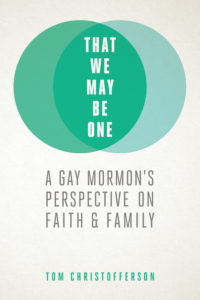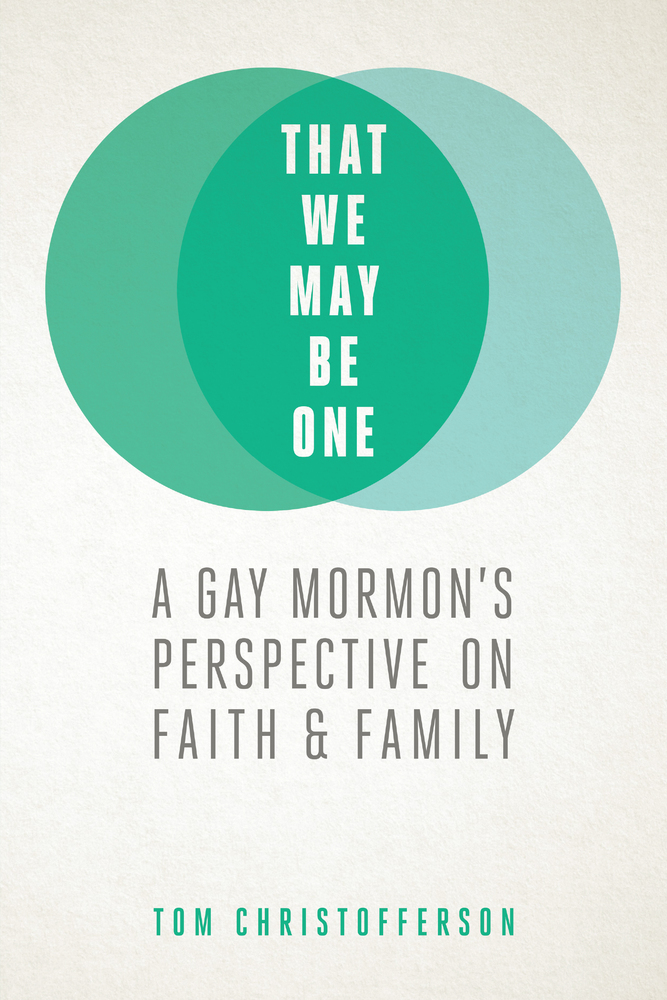 In his new book, That We May Be One: A Gay Mormon’s Perspective on Faith and Family (Published by Deseret Book), Tom Christofferson shares his story of coming to terms with being gay, leaving Mormonism for several decades, and then deciding to reunite with his beloved faith community. Along the way, it tells of his remarkable family and their reactions to his coming out and fully embracing as part of their family his longtime partner, a ward and stake in New Canaan, Connecticut, that welcomed him and his partner with open arms even though there was no sense, given their relationship, that they’d join the church, and a wrenching decision that followed when Tom felt called to seek baptism again and enter into full fellowship with the Saints. The book, and this interview, shares intimate peeks at Tom’s spiritual life, his hopes for what might open up within Mormonism as he shares his story so publicly. Mormon Matters host Dan Wotherspoon also queries Tom about difficult doctrines in Mormonism that can and seem to present obstacles to the church’s fully embracing LGBTQIA members, as well as worries from people who know Tom’s basic story but fear it will be used by certain LDS parents as the new standard for their own gay children: “If Tom can return to stay Mormon and be celibate, so can you.”
In his new book, That We May Be One: A Gay Mormon’s Perspective on Faith and Family (Published by Deseret Book), Tom Christofferson shares his story of coming to terms with being gay, leaving Mormonism for several decades, and then deciding to reunite with his beloved faith community. Along the way, it tells of his remarkable family and their reactions to his coming out and fully embracing as part of their family his longtime partner, a ward and stake in New Canaan, Connecticut, that welcomed him and his partner with open arms even though there was no sense, given their relationship, that they’d join the church, and a wrenching decision that followed when Tom felt called to seek baptism again and enter into full fellowship with the Saints. The book, and this interview, shares intimate peeks at Tom’s spiritual life, his hopes for what might open up within Mormonism as he shares his story so publicly. Mormon Matters host Dan Wotherspoon also queries Tom about difficult doctrines in Mormonism that can and seem to present obstacles to the church’s fully embracing LGBTQIA members, as well as worries from people who know Tom’s basic story but fear it will be used by certain LDS parents as the new standard for their own gay children: “If Tom can return to stay Mormon and be celibate, so can you.”
Please listen and enjoy getting to know this wonderful, spiritual, open-hearted man.
_____
Links:
Tom Christofferson, That We May Be One: A Gay Mormon’s Perspective on Faith and Family (Deseret Book, 2017), paperback
Gregory Prince, “Science vs Dogma: Biology Challenges the LDS Paradigm of Homosexuality,” Tanner-McMurrin Lecture, delivered 27 October 2017, Salt Lake City Utah


Comments 4
I’m very happy that Tom has found peace and happiness in his journey and that he was willing to do this interview. It couldn’t have been easy.
That said, this does seem to be a cautionary tail for anyone considering dating a gay Mormon who still holds a strong belief in the church. (And i certainly recognize that there are no guarantees in any relationship, but this is a tough one for me.)
Pingback: A Gay Mormon’s Perspective on Faith and Family | faith again
Finished this one, and just finished Gina’s ATF podcast. A few things:
I’m fairly impressed with the Christofferson family. I think if more families responded like that, things would be a lot better…not saying things are perfect, but it could’ve been a much worse story. I think it’s fantastic that we have a Deseret Book offering that will be raising these issues and modeling a different way, BUT (there has to be a “but”), I am troubled that this is just one option. That is, as far as I know, Elder Oaks’ comments in 2006 were that he would imagine “in most circumstances” that parents wouldn’t be OK with having a child’s same-sex partner over.
This actually raises an interesting issue. I’m glad that Tom is sensitive to and resistant about the possibility that his story might be used as a “one-size fits all” solution. BUT I’m troubled that this applies to the good parts of the story — the church apparently cannot decide that rejecting gay children and their partners is unacceptable. Tom’s family’s acceptance of him and his ex-partner is just one option among many.
I appreciated the discussion regarding why some gay folks would not want to be changed in the afterlife while others (and many straight members) find that possibility to be a balm. To me (and as I spoke at Sunstone a few years ago), this to me is a practical way for the atonement to work in a works-heavy LDS theology. That is, LDS theology is so set on individual choice that it seems unfair to posit something that cannot be changed through righteous action. But, alas, even if there is something like same-sex identity, here comes the Atonement to save the day. However…
I think the discussion on sexual orientation being more than just about sex — but a core part of interacting with the world — is true. So, to be changed in the afterlife is essentially to say: “I won’t be the same type of person in the afterlife”. I think for folks who like themselves, this is horrific (and it’s true whenever similar changes are recommended…for example, women who recoil at celestial polygamy will typically recoil at the idea that in the afterlife, they will be changed to be more amenable to it.) I don’t want to speak for everyone, but I suspect that people who would appreciate the change have some sort of deep loathing for that part of themselves, so they would be OK with being transformed into another person. I think this has deep ties to suicidality on this issue, but I’m not an expert.
This is actually something Tom said in both this podcast and Gina’s ATF podcast episode. At some point in both episodes (it’s around 7:45 here), he says that when he was younger, praying that God would take away his homosexuality, that what he was really praying for was that “God would take away the spirit that was in his body and plant a new one.”
This is crucial. There’s a recognition that a change in sexual orientation would be a change in one’s basic person. That’s what he was looking for when he was younger.
I understood what Tom meant when he said he knows that folks saying that gay people can be straight in the afterlife mean it well. I think this is true for LGBT folks now and I think this was true of race in the past. I mean, in my life, I have had someone tell me that they were so impressed by my righteousness and were sure that I would become white and delightsome in the next life…and whether it is LGBT issues or race, I can see how this logic works. If you are at all aware, then you understand that being LGBT or being a racial minority is difficult. It makes sense that someone would not want someone else to have this burden — this is what allows folk speculation to flourish, I think. People see the unfairness and they can’t grasp how that could be unless there’s a reason for it. Job must have done something wrong, as his friends argued. But the difference is that LGBT folks and racial minorities who accept themselves will conclude that it is society that needs to change and society that is wrong. In contrast, LDS folks are committed to believing that the plan is good, and therefore it is the individual that needs to change.
Pingback: Mormon Memoirs Roundup, Fall 2017 | Dawning of a Brighter Day